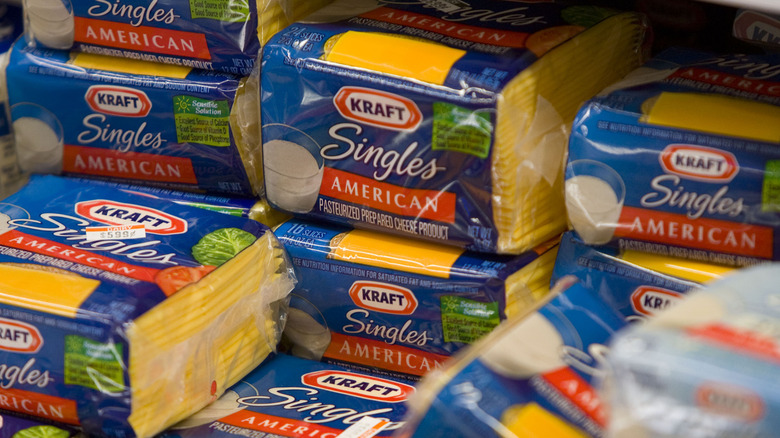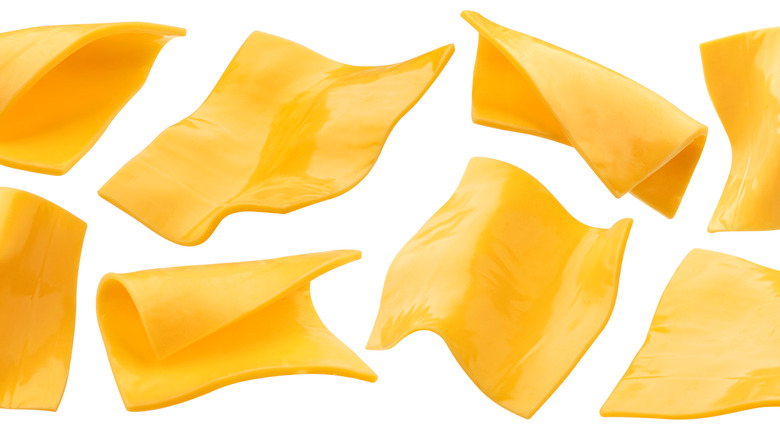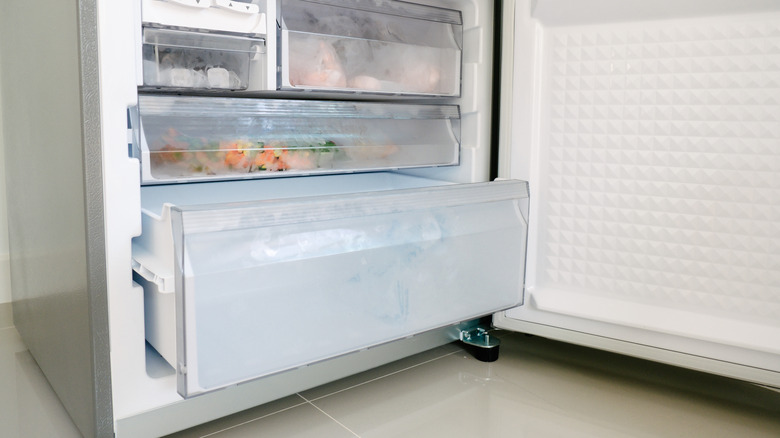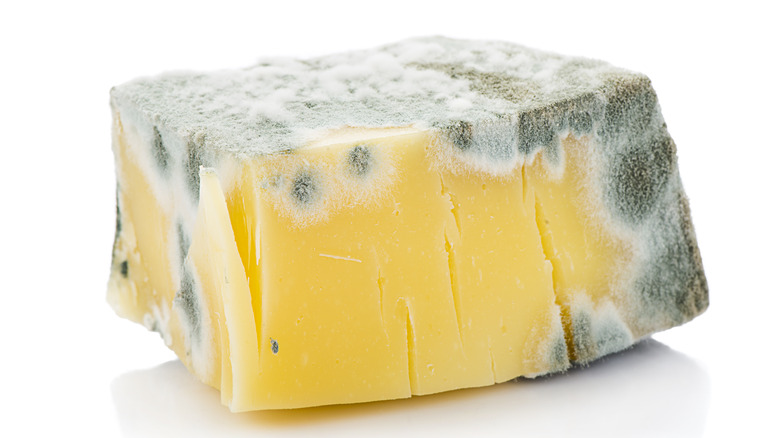How Long Does Kraft Cheese Last?
Sure, liking American cheese isn't the trendiest stance in the 21st century, the age of farm-to-table dining and organic produce. But there is a definite place for processed cheese in this world. It melts better than any other cheese, thanks to the sodium citrate it contains, and some sources say American cheese was used on the very first cheeseburger (per History of Fast Food). It's been around longer than you might think, too. According to The New York Times, James L. Kraft invented processed cheese in 1916, and his namesake brand still dominates the business. If you've had American cheese, it was probably a Kraft single, which is actually stamped out of one big sheet, rather than sliced from a block.
Some people will try to shame you for eating American cheese (stop judging us, Gordon Ramsay). They'll tell you that it's not even cheese, which to be fair, is technically correct. The FDA states that process cheese (yes, it's "process", not "processed") must contain at least 51% "real" cheese such as cheddar, colby, or Swiss. According to HuffPost, Kraft singles don't meet this requirement.
But if it's not real cheese, does it still follow real cheese rules? That is to say, will it turn all fuzzy and green if you don't use it soon enough, or will it live on indefinitely like some indestructible dairy Frankenstein?
This is how long Kraft cheese is good for
American cheese is meant to outlast other cheeses. According to The New York Times, that was the whole point of James Kraft's endeavor. He wanted to create a shelf-stable dairy product that could be shipped long distances without spoiling. The preservatives in Kraft cheese have caused some controversy. Kraft used to use an artificial preservative called sorbic acid, but in 2014, NBC News reported that Kraft would ditch the ingredient and replace it with a natural preservative called natamycin, which is not absorbed by the human body. Natamycin performs the same role as sorbic acid, fighting mold.
Bacterial growth is the main reason cheeses go bad, so American cheese will hang around in your fridge for quite some time. The expiration date printed on packages is generally about five to six months after the cheese is produced, but you'll probably be safe using that just as a guideline. Expiration dates are less scientific than you'd think. Per Eat Pallet, unopened slices of American cheese can last up to two months beyond the printed date (though you should, of course, toss the cheese once it starts looking dried-out).
Everything changes when you open the cheese, though. Once you've peeled off that plastic, you should use the slice within a week. Also, these guidelines are only true if you're using a refrigerator. At room temperature, even processed cheese can only hold up for about two hours.
Can you store Kraft cheese in the freezer?
Sometimes, there's a difference between what you can do and what you should do, and freezing cheese is one of those cases. Back in 1986, a woman wrote to The South Florida Sun-Sentinel asking if she could freeze American cheese. The outlet responded by saying it was technically possible but discouraged freezing cheese of any kind because it could alter the flavor and texture. Eat Pallet echoes this sentiment, noting that freezing and thawing Kraft singles will make them grainy, and they won't melt as easily. As meltability is one of, if not the, main selling points of American cheese, freezing it would defeat the purpose.
Although it's not what the company is best known for, Kraft does make "real" cheese, sold as Kraft Natural Cheese. The offerings include cheddar, mozzarella, jack, and colby. Healthline explains that semi-soft cheeses such as these can be frozen safely, but it's not optimal from a culinary standpoint. As with American cheese, freezing will compromise their meltability, and they can become grainy and crumbly in their raw form.
There's technically no limit to how long you can keep cheese frozen, but it's generally best to use it within six to nine months.
How to tell Kraft cheese has gone bad
Just because Kraft cheese is bolstered by anti-mold preservatives doesn't mean it won't go bad eventually. It will just take a much longer time to spoil than unprocessed cheese.
Mold can sometimes grow on American cheese, according to Still Tasty, and this is a clear sign that it's time to pitch those slices. However, you shouldn't rely solely on mold to tell you if your cheese has gone bad. You need to use your senses. It's a problem we also face with blue cheese, although in that case, it's not that the cheese has anti-mold properties, but rather the fact that it looks moldy to begin with.
Beyond mold, the clearest indicators of spoilage are touch and smell. Eat Pallet warns against eating American cheese that has a slimy texture or a sour odor. We all know what a Kraft single looks and feels like: vibrant orange, a tad shiny, and, let's be honest, somewhat rubbery to the touch. Let this knowledge guide you, and if your cheese doesn't look, feel, or smell the way you think it should, just throw it in the compost.
Is it safe to eat expired Kraft cheese?
Eating expired cheese can lead to food poisoning, as it could expose you to dangerous bacteria such as E. coli, Salmonella, and Listeria (per Healthline). The most common symptoms are stomach aches, vomiting, and diarrhea. That's definitely going to put a damper on your day, so you shouldn't even risk it. If you're even slightly unsure if your cheese has gone bad, play it safe and get rid of the stuff.
You may have heard that you can still eat moldy cheese if you just cut the moldy spots out, but this is only true for thick blocks of firm cheeses such as cheddar or colby. Mold generally doesn't penetrate beyond firm cheeses' surfaces, so you can cut off the exterior and eat what remains. On the other hand, the Mayo Clinic warns that mold can easily penetrate through soft cheeses, as well as any pre-shredded or pre-sliced cheese.
So, if you're using American cheese slices and you find that one has spoiled, you should throw it out. And you may want to ditch the whole package to be on the safe side.




